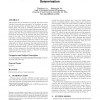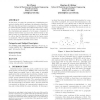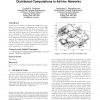120
click to vote
WISEC
2010
ACM
15 years 7 months ago
2010
ACM
The locations of base stations are critically important to the viability of wireless sensor networks. In this paper, we examine the location privacy problem from both the attack a...
112
click to vote
WWIC
2004
Springer
15 years 7 months ago
2004
Springer
Wireless sensor networks are based on the collaborative efforts of many small wireless sensor nodes, which collectively are able to form networks through which sensor information c...
125
Voted
NPC
2004
Springer
15 years 7 months ago
2004
Springer
Online mining in large sensor networks just starts to attract interest. Finding patterns in such an environment is both compelling and challenging. The goal of this position paper ...
127
click to vote
MIDDLEWARE
2004
Springer
15 years 7 months ago
2004
Springer
The miniaturization of hardware components has lead to the development of Wireless Sensor Networks (WSN) and networked-applications over them. Meanwhile, middleware systems have a...
135
click to vote
MDM
2004
Springer
15 years 7 months ago
2004
Springer
In order to fully realize the potential of sensor networks, energy awareness should be incorporated into every stage of the network design and operation. In this paper, we address...
136
Voted
IPSN
2004
Springer
15 years 7 months ago
2004
Springer
Wireless sensor networks provide an attractive approach to spatially monitoring environments. Wireless technology makes these systems relatively flexible, but also places heavy d...
108
click to vote
IPSN
2004
Springer
15 years 7 months ago
2004
Springer
We propose an entropy-based sensor selection heuristic for localization. Given 1) a prior probability distribution of the target location, and 2) the locations and the sensing mod...
129
Voted
IPSN
2004
Springer
15 years 7 months ago
2004
Springer
In this paper, we study the optimal way of distributing sensors in a random field to minimize the estimation distortion. We show that this problem is equivalent to certain proble...
116
click to vote
IPSN
2004
Springer
15 years 7 months ago
2004
Springer
In this paper we develop algorithms for distributed computation of a broad range of estimation and detection tasks over networks with arbitrary but fixed connectivity. The distri...
129
click to vote
IPSN
2004
Springer
15 years 7 months ago
2004
Springer
Wireless sensor networks are capable of collecting an enormous amount of data over space and time. Often, the ultimate objective is to derive an estimate of a parameter or functio...



